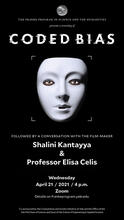When MIT Media Lab researcher Joy Buolamwini discovers that many facial recognition technologies misclassify women and darker-skinned faces, she delves into an investigation of widespread bias in algorithms.
Immediately following the screening, Professor Elisa Celis will moderate a discussion with the filmmaker, Shalini Kantayya.
This event is co-sponsored by the Computation and Society Initiative at Yale and the Office of the FAS Dean of Science.
Professor Elisa Celis:
Professor Elisa Celis is an assistant professor in the Statistics & Data Science department at Yale University. She studies the manifestation of social and economic biases in our online lives via the algorithms that encode and perpetuate them. Her work spans multiple disciplines including data science, machine learning, and theoretical computer science with an emphasis on fairness and diversity in artificial intelligence and machine learning. Professor Celis’ research focuses on problems that arise at the interface of computation and machine learning and its societal and economic ramifications. She approaches these problems by using both experimental and theoretical techniques. Her work spans multiple areas including social computing and crowdsourcing, data science, and algorithm design with an emphasis on fairness and diversity in artificial intelligence and machine learning. Her recent works include methodologies for debiasing data, approaches to produce diverse ranking and recommendation systems, mechanisms to avoid discrimination in access to opportunity in online advertisements, and the design of voting techniques that allow for the election of diverse committees.
